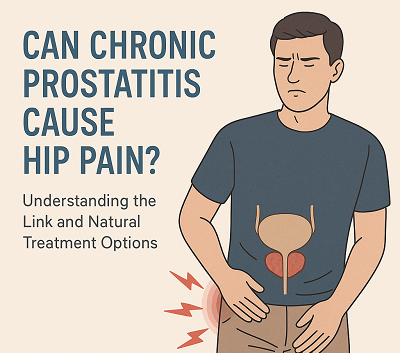Can Chronic Prostatitis Cause Hip Pain? Understanding the Link and Natural Treatment Options
When men experience chronic hip pain, the usual suspects are arthritis, sciatica, or musculoskeletal strain. Rarely does the prostate come into the picture. Yet, for many men dealing with chronic prostatitis, this unexpected symptom—hip pain—is not only real but deeply disruptive.

So, can chronic prostatitis cause hip pain?
The answer is a firm yes—and understanding this link requires looking through both the lens of modern medicine and the wisdom of Traditional Chinese Medicine (TCM).
What Is Chronic Prostatitis?
Chronic prostatitis, or chronic pelvic pain syndrome (CPPS), is a condition marked by long-lasting inflammation or dysfunction of the prostate gland. Unlike acute prostatitis, it is often non-bacterial, meaning no infection is detected—yet the discomfort persists for months or even years.
Common symptoms include:
Frequent urination or urinary urgency
Perineal, testicular, or lower abdominal pain
Pain after ejaculation or during bowel movements
General pelvic discomfort
Radiating pain to the lower back, thighs—and hips
This final symptom is often overlooked, even by professionals.
Western Medicine: How Prostatitis Triggers Hip Pain
From an anatomical standpoint, the prostate lies deep within the pelvic cavity, surrounded by a complex network of nerves, muscles, and connective tissues.
1. Referred Pain via Nerves:
The pelvic region and hips share neural pathways. Inflammation in the prostate can irritate pudendal and sacral nerves, leading to pain felt in the hips, thighs, and even buttocks.
2. Pelvic Muscle Tension:
Chronic prostatitis often leads to tight pelvic floor muscles. These muscles interconnect with the gluteal region and hip stabilizers. When tense, they refer pain outward into the hip joints.
3. Postural Compensation:
Persistent pelvic pain changes how you sit or walk. Over time, this altered posture leads to overuse of hip muscles, causing chronic soreness or even joint inflammation.
The TCM Perspective: Hip Pain as a Manifestation of Kidney and Liver Imbalance
In Traditional Chinese Medicine, the prostate isn't described in modern anatomical terms, but its function and symptoms fall under the realm of Kidney, Bladder, and sometimes Liver systems.
Here's how TCM explains the hip pain associated with chronic prostatitis:
1. Kidney Deficiency Affects the Bones and Joints
The Kidneys in TCM "govern the bones" and are responsible for nourishing the lower back, knees, and hips.
When Kidney Yang or Kidney Yin is deficient—often due to overwork, excessive sexual activity, or aging—the bones and joints become weak and painful. Chronic prostatitis, often rooted in Kidney deficiency, may thus lead to hip pain as a secondary manifestation.
2. Damp-Heat in the Lower Jiao
Chronic prostatitis is typically categorized under the TCM syndrome of Damp-Heat pouring downward into the Lower Jiao (lower abdomen and urogenital area).
This pathological Damp-Heat obstructs the meridians, preventing smooth flow of Qi and Blood to the hips and pelvis—leading to heavy, sore, or burning pain in those areas.
3. Liver Qi Stagnation and Blood Stasis
TCM teaches that emotional stress and long-term illness cause Liver Qi to stagnate. Over time, this stagnation turns into Blood Stasis, which causes fixed, sharp, and radiating pain—commonly in the pelvic and hip region.
Why Some Treatments Fail—and What Works Better
Antibiotics are typically ineffective in treating non-bacterial chronic prostatitis. Physical therapy may offer temporary relief, but it doesn't address the underlying inflammation or energetic imbalances.
This is why more men are turning to herbal therapies like the Diuretic and Anti-inflammatory Pill—a formulation rooted in TCM theory.
How Diuretic and Anti-inflammatory Pill Helps Hip Pain from Chronic Prostatitis
This natural herbal remedy works by:
Clearing Damp-Heat from the lower Jiao
Activating blood circulation to resolve stasis, especially in the pelvic and hip region
Strengthening Kidney and Liver functions, improving the structural integrity of the hips and spine
Relaxing tight pelvic muscles, easing tension and referred pain
Improving urination and reproductive system function, restoring overall balance
Unlike painkillers or short-term interventions, this herbal formula supports long-term healing without harmful side effects, aligning both with modern pathophysiology and TCM theory.
When to Suspect Chronic Prostatitis Is Causing Your Hip Pain
You may need to consider this connection if:
You have chronic hip or groin pain without clear musculoskeletal cause
Your symptoms fluctuate with stress, fatigue, or sexual activity
Sitting for long periods worsens your hip or pelvic discomfort
You have co-occurring urinary symptoms (frequency, urgency, burning)
In such cases, it's worth seeking an evaluation focused on prostate health, not just orthopedic causes.
Final Thoughts: Healing from the Root
Hip pain caused by chronic prostatitis is real, complex, and often misunderstood. Western medicine offers valuable insights into anatomy and nerve pathways, while TCM provides a deeper understanding of energetic imbalances that affect the entire lower body.
The good news? With the right approach—especially through natural, targeted therapies like the Diuretic and Anti-inflammatory Pill—relief is not only possible but sustainable.
If you're tired of temporary solutions and want to treat your pain from the inside out, consider exploring the combined wisdom of ancient Chinese medicine and modern holistic care.
You may also be interested in:
Can Chronic Prostatitis Cause Urethral Itching?
Herbal Solutions for Chronic Prostatitis: A Natural Approach to Healing
Chronic Prostatitis Treatment: Pelvic Floor Therapy vs. Traditional Chinese Medicine



